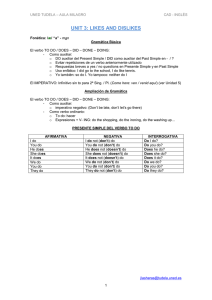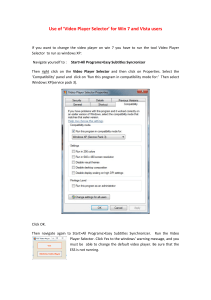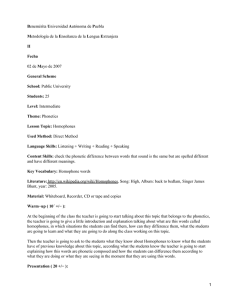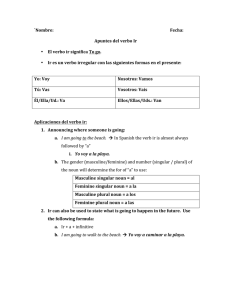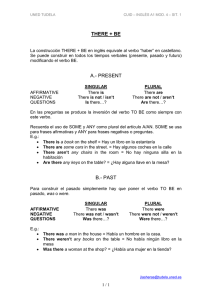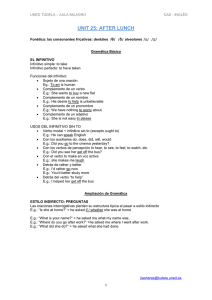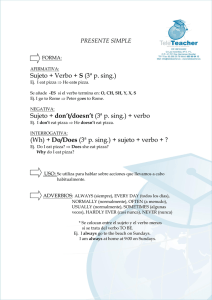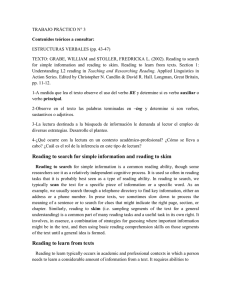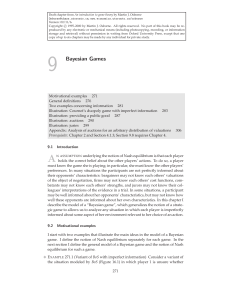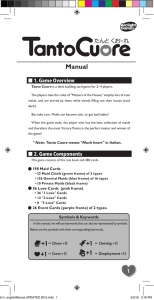Spanish Homophone Playing Cards
Anuncio
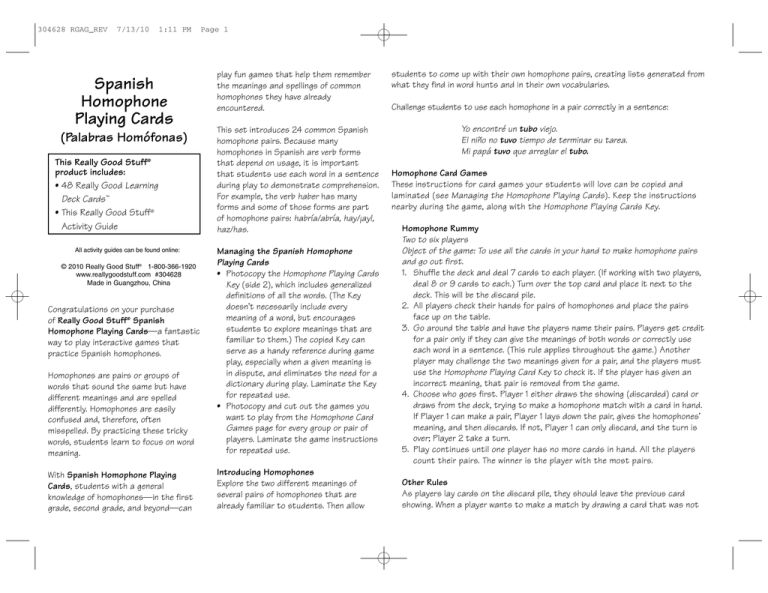
304628 RGAG_REV 7/13/10 1:11 PM Spanish Homophone Playing Cards (Palabras Homófonas) This Really Good Stuff® product includes: • 48 Really Good Learning Deck Cards™ • This Really Good Stuff® Activity Guide All activity guides can be found online: Page 1 play fun games that help them remember the meanings and spellings of common homophones they have already encountered. This set introduces 24 common Spanish homophone pairs. Because many homophones in Spanish are verb forms that depend on usage, it is important that students use each word in a sentence during play to demonstrate comprehension. For example, the verb haber has many forms and some of those forms are part of homophone pairs: habría/abría, hay/¡ay!, haz/has. Homophones are pairs or groups of words that sound the same but have different meanings and are spelled differently. Homophones are easily confused and, therefore, often misspelled. By practicing these tricky words, students learn to focus on word meaning. Managing the Spanish Homophone Playing Cards • Photocopy the Homophone Playing Cards Key (side 2), which includes generalized definitions of all the words. (The Key doesn’t necessarily include every meaning of a word, but encourages students to explore meanings that are familiar to them.) The copied Key can serve as a handy reference during game play, especially when a given meaning is in dispute, and eliminates the need for a dictionary during play. Laminate the Key for repeated use. • Photocopy and cut out the games you want to play from the Homophone Card Games page for every group or pair of players. Laminate the game instructions for repeated use. With Spanish Homophone Playing Cards, students with a general knowledge of homophones—in the first grade, second grade, and beyond—can Introducing Homophones Explore the two different meanings of several pairs of homophones that are already familiar to students. Then allow © 2010 Really Good Stuff 1-800-366-1920 www.reallygoodstuff.com #304628 Made in Guangzhou, China ® Congratulations on your purchase of Really Good Stuff® Spanish Homophone Playing Cards—a fantastic way to play interactive games that practice Spanish homophones. students to come up with their own homophone pairs, creating lists generated from what they find in word hunts and in their own vocabularies. Challenge students to use each homophone in a pair correctly in a sentence: Yo encontré un tubo viejo. El niño no tuvo tiempo de terminar su tarea. Mi papá tuvo que arreglar el tubo. Homophone Card Games These instructions for card games your students will love can be copied and laminated (see Managing the Homophone Playing Cards). Keep the instructions nearby during the game, along with the Homophone Playing Cards Key. Homophone Rummy Two to six players Object of the game: To use all the cards in your hand to make homophone pairs and go out first. 1. Shuffle the deck and deal 7 cards to each player. (If working with two players, deal 8 or 9 cards to each.) Turn over the top card and place it next to the deck. This will be the discard pile. 2. All players check their hands for pairs of homophones and place the pairs face up on the table. 3. Go around the table and have the players name their pairs. Players get credit for a pair only if they can give the meanings of both words or correctly use each word in a sentence. (This rule applies throughout the game.) Another player may challenge the two meanings given for a pair, and the players must use the Homophone Playing Card Key to check it. If the player has given an incorrect meaning, that pair is removed from the game. 4. Choose who goes first. Player 1 either draws the showing (discarded) card or draws from the deck, trying to make a homophone match with a card in hand. If Player 1 can make a pair, Player 1 lays down the pair, gives the homophones’ meaning, and then discards. If not, Player 1 can only discard, and the turn is over; Player 2 take a turn. 5. Play continues until one player has no more cards in hand. All the players count their pairs. The winner is the player with the most pairs. Other Rules As players lay cards on the discard pile, they should leave the previous card showing. When a player wants to make a match by drawing a card that was not 304628 RGAG_REV 7/13/10 1:11 PM Page 2 the last one discarded, all the cards must be picked up after it as well. The player must make a match using the first card picked up. Variations: • Give two points for each homophone pair or just one point if the player gives the correct meaning for one of the words but not the other. • Each player replenishes the cards in hand after every turn, bringing the hand back up to seven (or eight or nine) cards. The game is over when the deck runs out. Players count their pairs to determine the winner. • Play the game in several rounds, keeping track of points from round to round. The winner is the player who reaches a score, such as 100, first. Homophone Shuffle Two or more players Additional materials: Lined paper folded lengthwise, pencil, dictionary 1. The players write their names at the top of the columns on the folded paper or sort grid. This will be a recording sheet. 2. Player 1 selects five or more homophone pairs and mixes up the cards. Player 1 holds up the cards with the backs facing Player 2, and asks Player 2 to pick a card. 3. Player 2 picks a card, turns it over, and reads the word aloud. Player 2 must say what the word means or use it in a sentence. If it is the correct meaning of the word, Player 2 writes the word in the column under Player 2’s name. Players can challenge the meaning given. If the answer is wrong, Player 2 does not get to write the word the column. If the players disagree on the meaning, they can look up the word. 4. Player 1 sorts and puts back the homophone pairs, and Player 2 takes a turn choosing pairs, shuffling them, and holding them up for the next player. 5. The first player to fill every line in the column is the winner. Homophone Playing Cards Key s.= sustantivo v. = verbo adj.= adjetivo prep. = preposición exp. = expresión arroyo asta azar arrollo hasta asar v. Hacer un rollo con hilo prep. El lugar a que llega algo v. Guisar vaca s. Hembra del toro bienes botar s. Río pequeño s. Palo de la bandera s. Acaso, destino, por casualidad s. Sitio en donde se coloca el equipaje en un autobús s. Fortuna, dinero v. Tirar vienes votar calló casar v. Del verbo callar v. Contraer matrimonio cayó cazar cien ciento s. 100 s. Número sien siento cocer habría hacía hay v. Cocinar v. Del verbo haber v. El pasado del verbo hacer v. Del verbo haber coser abría Asía ¡ay! haz v. Mandato del verbo hacer has hecho hierba hola adj. Maduro, completo s. Planta s. Un saludo echo hierva ola hora mesa rayar s. División del tiempo s. Mueble o escritorio v. Escribir ora meza rallar sumo tubo vaso adj. Supremo, muy elevado s. Objeto cilíndrico hueco s. Vasija de vidrio para contener líquidos zumo tuvo baso v. Del verbo venir v. Hacer un voto con el propósito de elegir a alguien v. Del verbo caerse |v. Atrapar y matar un animal para comérselo s. La frente v. Del verbo sentir – percibir sensaciones v. Hacer un vestido v. Del verbo abrir s. Un continente exp. Expresión que indica sorpresa o dolor Del verbo haber “Tú has ido varias veces a mi casa.” v. Del verbo echar (lanzar) v. Del verbo hervir s. Onda que se forma en el en el mar s. Relacionada con la oración v. Del verbo mecer v. Desmenuzar una cosa con el rallador s. Jugo v. Del verbo tener v. Poner algo sobre una base baca
